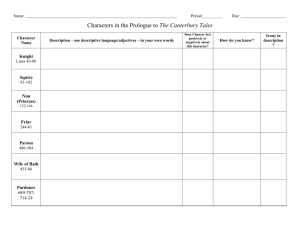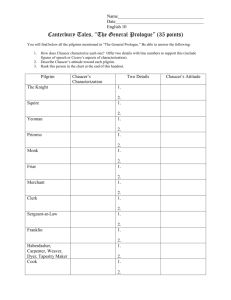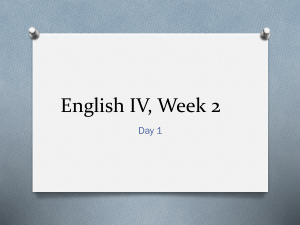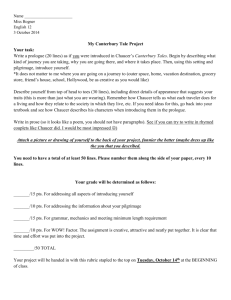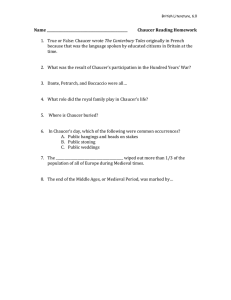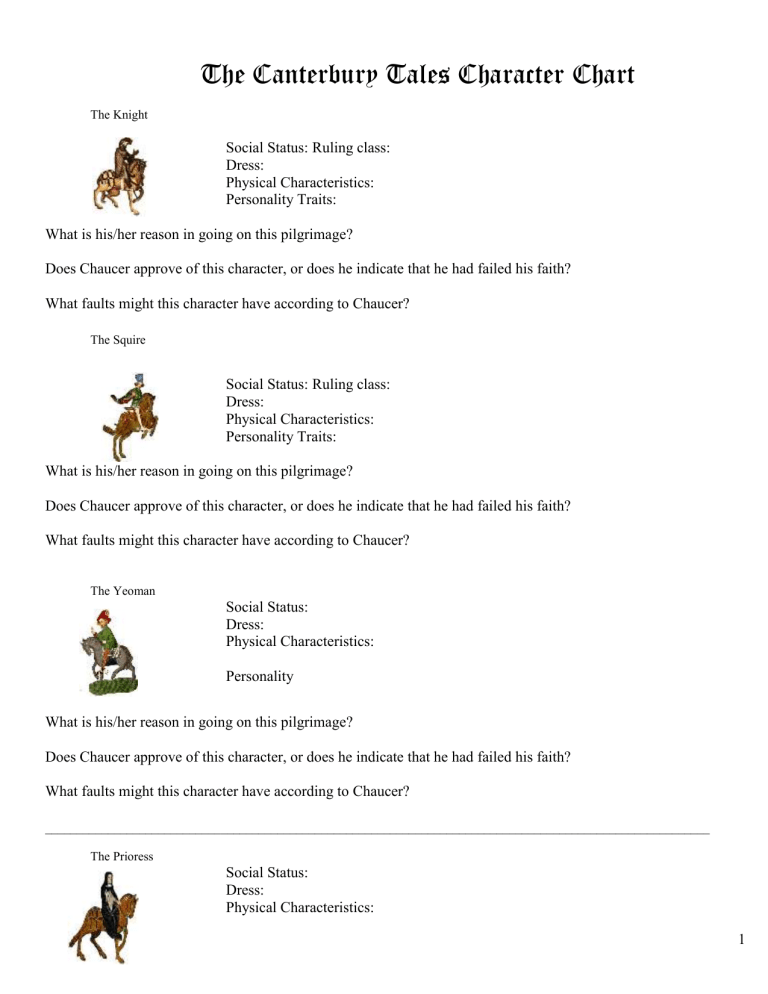
The Canterbury Tales Character Chart The Knight Social Status: Ruling class: Dress: Physical Characteristics: Personality Traits: What is his/her reason in going on this pilgrimage? Does Chaucer approve of this character, or does he indicate that he had failed his faith? What faults might this character have according to Chaucer? The Squire Social Status: Ruling class: Dress: Physical Characteristics: Personality Traits: What is his/her reason in going on this pilgrimage? Does Chaucer approve of this character, or does he indicate that he had failed his faith? What faults might this character have according to Chaucer? The Yeoman Social Status: Dress: Physical Characteristics: Personality What is his/her reason in going on this pilgrimage? Does Chaucer approve of this character, or does he indicate that he had failed his faith? What faults might this character have according to Chaucer? __________________________________________________________________________________________________________ The Prioress Social Status: Dress: Physical Characteristics: 1 Personality Traits: What is his/her reason in going on this pilgrimage? Does Chaucer approve of this character, or does he indicate that he had failed his faith? What faults might this character have according to Chaucer? The MonkTh The Monk Social Status: Dress: Physical Characteristics: Personality Traits: What is his/her reason in going on this pilgrimage? Does Chaucer approve of this character, or does he indicate that he had failed his faith? What faults might this character have according to Chaucer? The Friar Social Status: Dress: Physical Characteristics: Personality Traits: What is his/her reason in going on this pilgrimage? Does Chaucer approve of this character, or does he indicate that he had failed his faith? What faults might this character have according to Chaucer? The Merchant Social Status: Dress: Physical Characteristics: Personality Traits: What is his/her reason in going on this pilgrimage? Does Chaucer approve of this character, or does he indicate that he had failed his faith? What faults might this character have according to Chaucer? 2 The Oxford Cleric Social Status: Dress: Physical Characteristics: Personality Traits: What is his/her reason in going on this pilgrimage? Does Chaucer approve of this character, or does he indicate that he had failed his faith? What faults might this character have according to Chaucer? The Man of Law Social Status: Dress: Physical Characteristics: Personality Traits: What is his/her reason in going on this pilgrimage? Does Chaucer approve of this character, or does he indicate that he had failed his faith? What faults might this character have according to Chaucer? The Franklin Social Status: Dress: Physical Characteristics: eard, Personality Traits: What is his/her reason in going on this pilgrimage? Does Chaucer approve of this character, or does he indicate that he had failed his faith? What faults might this character have according to Chaucer? The Tradesmen (Carpetmaker, Haberdaser Dyer, Carpenter, Weaver) Social Status: Dress: Physical Characteristics: What is his/her reason in going on this pilgrimage? Does Chaucer approve of this character, or does he indicate that he had failed his faith? 3 What faults might this character have according to Chaucer? The Cook Social Status: Dress: Physical Characteristics: Personality Traits: What is his/her reason in going on this pilgrimage? Does Chaucer approve of this character, or does he indicate that he had failed his faith? What faults might this character have according to Chaucer? The Skipper/Shipman Social Status: Dress: Physical Characteristics: Personality Traits: What is his/her reason in going on this pilgrimage? Does Chaucer approve of this character, or does he indicate that he had failed his faith? What faults might this character have according to Chaucer? The Doctor Social Status: Dress: Physical Characteristics: Personality Traits: What is his/her reason in going on this pilgrimage? Does Chaucer approve of this character, or does he indicate that he had failed his faith? What faults might this character have according to Chaucer? 4 The Wife of Bath Social Status: Dress: Physical Characteristics: Personality Traits: What is his/her reason in going on this pilgrimage? Does Chaucer approve of this character, or does he indicate that he had failed his faith? What faults might this character have according to Chaucer? The Parson Social Status: Dress: Physical Characteristics: Personality Traits: What is his/her reason in going on this pilgrimage? Does Chaucer approve of this character, or does he indicate that he had failed his faith? What faults might this character have according to Chaucer? The Plowman Social Status: Dress: Physical Characteristics: Personality Traits: What is his/her reason in going on this pilgrimage? Does Chaucer approve of this character, or does he indicate that he had failed his faith? What faults might this character have according to Chaucer? The Miller Social Status: Dress: Physical Characteristics: Personality Traits: What is his/her reason in going on this pilgrimage? Does Chaucer approve of this character, or does he indicate that he had failed his faith? What faults might this character have according to Chaucer? 5 The Manciple Social Status: Trade Class – Dress: Physical Characteristics: Personality Traits: What is his/her reason in going on this pilgrimage? Does Chaucer approve of this character, or does he indicate that he had failed his faith? What faults might this character have according to Chaucer? The Reeve Social Status: Dress: Physical Characteristics: Personality Traits: What is his/her reason in going on this pilgrimage? Does Chaucer approve of this character, or does he indicate that he had failed his faith? What faults might this character have according to Chaucer? The Summoner Social Status: Dress: Physical Characteristics Personality Traits: What is his/her reason in going on this pilgrimage? Does Chaucer approve of this character, or does he indicate that he had failed his faith? What faults might this character have according to Chaucer? The Pardoner Social Status: Dress: Physical Characteristics: Personality Traits: 6 What is his/her reason in going on this pilgrimage? Does Chaucer approve of this character, or does he indicate that he had failed his faith? What faults might this character have according to Chaucer? The Host (Harry Bailey) Social Status: Dress: Physical Characteristics: Personality Traits: What is his/her reason in going on this pilgrimage? Does Chaucer approve of this character, or does he indicate that he had failed his faith? What faults might this character have according to Chaucer? Characters The Pilgrims The Narrator A character called Geoffrey Chaucer. We should be wary of accepting his words and opinions as Chaucer’s own. In the General Prologue, the narrator presents himself as a gregarious and naïve character. Later on, the Host accuses him of being silent and sullen. The narrator writes down his impressions of the pilgrims from memory. What he chooses to remember about the characters tells us as much about the narrator’s own prejudices as it does about the characters themselves. The Knight The first pilgrim Chaucer describes in the General Prologue and the teller of the first tale. The Knight represents the ideal of a medieval Christian man-at-arms. He has participated in no less than 15 of the great crusades of his era. Brave, experienced, and prudent, the narrator greatly admires him. The Wife of Bath A seamstress by occupation and an “expert on marriage.” The Wife of Bath has been married five times and had many other affairs in her youth, making her well practiced in the art of love. She presents herself as someone who loves marriage and sex, but, from what we see of her, she also takes pleasure in rich attire, talking, and arguing. She is deaf in one ear and has a gap between her front teeth, which was considered attractive in Chaucer’s time. She has traveled on pilgrimages to Jerusalem three times and elsewhere in Europe as well. Bath is an English town on the Avon River, not the name of this woman’s husband. The Pardoner A charlatan, who “officially” forgives people’s sins for a price. Pardoners granted papal indulgences—reprieves from penance in 7 exchange for charitable donations to the Church. Many pardoners, including this one, collected profits for themselves. Chaucer’s Pardoner excels in fraud, carrying a bag full of fake relics. For example, he claims to have the veil of the Virgin Mary. The Pardoner has long, greasy, yellow hair and is beardless. These characteristics were associated with shiftiness and gender ambiguity in Chaucer’s time. The Pardoner also has a gift for singing and preaching whenever he finds himself inside a church. The Miller Stout and brawny, with a wart on his nose and a big mouth, both literally and figuratively. He threatens the Host’s notion of propriety when he drunkenly insists on telling the second tale. Indeed, the Miller seems to enjoy overturning all conventions: He ruins the Host’s carefully planned storytelling order, he rips doors off hinges, and he tells a tale that is somewhat blasphemous, ridiculing religious and scholarly clerks, carpenters, and women. The Prioress A nun who heads a convent. Described as modest and quiet, this Prioress aspires to have exquisite taste. Her table manners are dainty, she knows French (though not the French of the court), she dresses well, and she is charitable and compassionate. The Monk A monk given to corporeal pleasures. Most monks of the Middle Ages lived in monasteries according to the Rule of Saint Benedict, which demanded that they devote their lives to “work and prayer.” This Monk cares little for the Rule; his devotion is to hunting and eating. He is large, loud, and well clad in hunting boots and furs. The Friar An example of the unscrupulous friars of Chaucer’s time. Roaming priests with no ties to a monastery, friars were great objects of criticism in Chaucer’s time. Always ready to befriend young women or rich men who might need his services, the friar actively administers the sacraments in his town, especially those of marriage and confession. However, Chaucer’s worldly Friar has taken to accepting bribes. The Summoner An official who brings persons accused of violating Church law to ecclesiastical court. This Summoner is a lecherous man whose face is scarred by leprosy. He gets drunk frequently, is irritable, and is not particularly qualified for his position. He spouts the few words of Latin he knows in an attempt to sound educated. The Host The leader of the group. The Host is large, loud, and merry, though he possesses a quick temper. He mediates and facilitates the flow of the pilgrims’ tales. His title of “host” may be a pun, suggesting both an innkeeper and the Eucharist, or Holy Host. The Parson The only devout churchman in the company. The Parson lives in poverty but is rich in holy thoughts and deeds. The pastor of a sizable town, he preaches the Gospel and makes sure to practice what he preaches. He’s everything that the Monk, Friar, and Pardoner aren’t. The Pardoner The Pardoner rides in the very back of the party in the General Prologue and is fittingly the most marginalized character in the company. His profession is somewhat dubious—pardoners offered indulgences, or previously written pardons for particular sins, to people who repented of the sin they had committed. Along with receiving the indulgence, the penitent would make a donation to the 8 Church by giving money to the pardoner. Eventually, this “charitable” donation became a necessary part of receiving an indulgence. Paid by the Church to offer these indulgences, the Pardoner was not supposed to pocket the penitents’ charitable donations. That said, the practice of offering indulgences came under critique by quite a few churchmen, since once the charitable donation became a practice allied to receiving an indulgence, it began to look like one could cleanse oneself of sin by simply paying off the Church. Additionally, widespread suspicion held that pardoners counterfeited the pope’s signature on illegitimate indulgences and pocketed the “charitable donations” themselves. Chaucer’s Pardoner is a highly untrustworthy character. He sings a ballad—“Com hider, love, to me!” (General Prologue, 672)—with the hypocritical Summoner, undermining the already challenged virtue of his profession as one who works for the Church. He presents himself as someone of ambiguous gender and sexual orientation, further challenging social norms. The narrator is not sure whether the Pardoner is an effeminate homosexual or a eunuch (castrated male). Like the other pilgrims, the Pardoner carries with him to Canterbury the tools of his trade—in his case, freshly signed papal indulgences and a sack of false relics, including a brass cross filled with stones to make it seem as heavy as gold and a glass jar full of pig’s bones, which he passes off as saints’ relics. Since visiting relics on pilgrimage had become a tourist industry, the Pardoner wants to cash in on religion in any way he can, and he does this by selling tangible, material objects—whether slips of paper that promise forgiveness of sins or animal bones that people can string around their necks as charms against the devil. After telling the group how he gulls people into indulging his own avarice through a sermon he preaches on greed, the Pardoner tells of a tale that exemplifies the vice decried in his sermon. Furthermore, he attempts to sell pardons to the group—in effect plying his trade in clear violation of the rules outlined by the host. The Squire The Knight’s son and apprentice. The Squire is curly-haired, youthfully handsome, and loves dancing and courting. The Clerk A poor student of philosophy. Having spent his money on books and learning rather than on fine clothes, the clerk is threadbare and wan. He speaks little, but when he does, his words are wise and full of moral virtue. The Man of Law A successful lawyer commissioned by the king. He upholds justice in matters large and small and knows every statute of England’s law by heart. The Manciple A clever fellow. A manciple was in charge of getting provisions for a college or court. Despite his lack of education, the Manciple is smarter than the 30 lawyers he feeds. The Merchant A trader in furs and cloth, mostly from Flanders. The merchant is part of a powerful and wealthy class in Chaucer’s society. The Shipman A well-traveled and well-tanned veteran sailor. The Shipman has seen every bay and river in England, as well as exotic ports in Spain and Carthage. He is a bit of a rascal, known for stealing wine while the ship’s captain sleeps. The Physician A talented doctor with expertise in diagnosing the causes and finding cures for most maladies. Though the Physician keeps himself in perfect physical health, the narrator calls into question the Physician’s spiritual health: He rarely consults the Bible and has an unhealthy love of financial gain. 9 The Franklin A man of leisure. The word franklin means “free man.” In Chaucer’s society, a franklin was neither a vassal serving a lord nor a member of the nobility. This particular franklin is a connoisseur of food and wine—so much so that his table remains laid and ready for food all day. The Reeve A shrewd steward of a manor. This reeve’s lord never loses so much as a ram to the other employees, and the vassals under his command are kept in line. However, he steals from his master. The Plowman The Parson’s brother and an equally good-hearted man. A member of the peasant class, he pays his tithes to the Church and leads a good Christian life. The Guildsmen A hatmaker, carpenter, weaver, clothing dyer, and a tapestry maker. The Guildsmen appear as a unit. English guilds were a combination of labor unions and social fraternities: Craftsmen of similar occupations joined together to increase their bargaining power and live communally. All five Guildsmen are clad in the livery of their brotherhood. The Cook The Guildsmen’s cook. The Narrator gives little detail about him, but he does mention a crusty sore on the Cook’s leg. The Yeoman The servant who accompanies the Knight and the Squire. The Narrator mentions that the Yoeman’s dress and weapons suggest he may be a forester. The Second Nun Not described in the General Prologue. She tells a saint’s life for her tale. The Nun’s Priest Also not described in the General Prologue. His story of Chanticleer, however, is well-crafted and suggests that he is a witty, selfeffacing preacher. Ruling Class: Clergy: Middle Class: Trade Class: Peasants: 10

